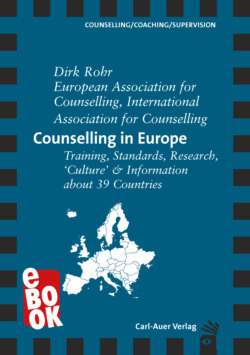Читать книгу Counselling in Europe - Dirk Rohr - Страница 9
На сайте Литреса книга снята с продажи.
2.2 Training Standards Guidelines
ОглавлениеEstablishing the standards to suit so many different countries proved to be a tricky balance. Some pushed for higher standards, and others wanted lower standards. It was clear that countries in which there were no agreed upon standards wanted lower standards. Eventually, the categories of European counsellor training standards were decided upon by the founding committee.
Over the years, there have been frequent discussions on this subject. And proposed training hours have been the subject of much debate, discussion and consultation. They reflect the need to incorporate the various 'levels' of counsellor under the European standards umbrella and promote the professional counsellor’s mobility across National boundaries to enhance the career path working towards "Counselling without Borders".
We have been fortunate to have committee members representing different countries, modalities, and comprehensive experience of the counselling profession internationally.
EAC now offers accreditation as a European Counsellor. You will find the standards and procedures for the European Certificate of Counsellor Accreditation award on these pages.
The goal has been to attempt to honour accreditation in the setting of standards for counselling across Europe.
The European Association for Counselling Synopsis of the History of Counselling
The emergence of the counselling profession could be said to be a twentieth-century phenomenon. Throughout the evolution of peoples, there have been healers for those who were emotionally traumatised. These included oracles, high priests, witch doctors, leaders in established religions and medical professionals. Because of the enormous sociological and cultural changes that swept Western Europe and the United States in particular, from the last half of the nineteenth century, the need for an additional and more specific professional response made itself felt. Professional family care started in the United States as early as 1877. Standardisation of the family social-work response had to come and was in place by 1911. It was in this Social Science working response that counselling techniques had their origins.
Theoretically, counselling training has its roots in philosophy, psychology and social science. It is broad-based and has drawn from a broad spectrum of scientific research. Buber’s concept of the 'I-Thou' relationship has been one of the fundamental philosophical underpinnings. At the turn of the nineteenth and twentieth centuries, Freudian psychoanalysis and its variations spread north to Germany, south to Switzerland and across the Atlantic to the United States. The early twentieth-century behaviourism of Pavlov, Watson and Skinner was influential in forming therapies for addictions.
The first university course on couple counselling was established in 1937. In 1943 the first training manual in counselling for social workers was published. The decade of the 1930s saw the setting up of Hirschfeld marriage consultation bureaux in Germany, Austria, Switzerland, and the Netherlands and the Scandinavian countries. In the countries where Hitler gained control, he annexed these bureaux to his evil purposes. Fortunately, as first conceived, these bureaux’s work continued in the United States, Britain, and Eastern European countries such as the Czech Republic, beyond Hitler’s reach. The centre in Prague was closed down in the communist putsch in 1948 and re-established again in 1967. The work done includes premarital, marital, post-divorce, parenting, psychological problems, and psychological assistance in life crises and problems in relationships with colleagues, neighbours and friends.
There are several theoretical bases and specialisations, which deal with particular presenting problems. What do these variously described approaches have in common?
Counselling has a role in child development, education, physical and mental health, and minority populations. In its position in the coming century, it is possible to see the profession as the conduit of an intrapersonal and interpersonal revolution that can facilitate the human person’s full development in a balanced society. This needs safe boundaries around such a task. A clear charter for ethical practice and accreditation guidelines and training must be agreed upon and disseminated across National boundaries. To this end, the European Association for Counselling sets out its criteria for those wishing to acquire the European Certificate in counselling.
The core value of the Charter is respect for human rights and differences. The attitudes that characterise the counselling approach are respect, integrity, authority, responsibility, autonomy, confidentiality, and competence. In the delivery of Practice, this leads to the skills of contracting, setting and maintaining boundaries, being explicit and open, monitoring the process and maintaining appropriate levels of privacy.
